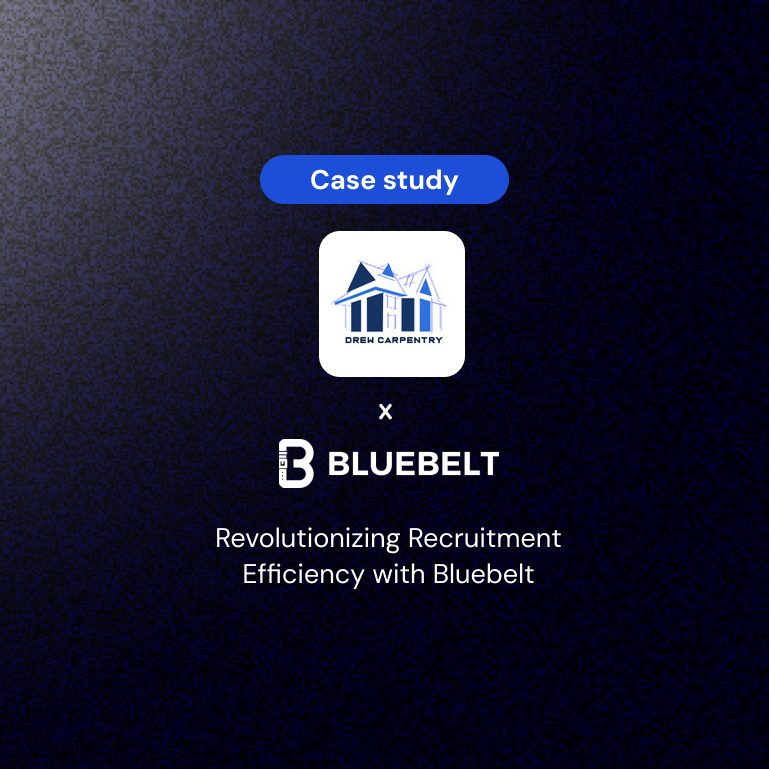
How to Conduct Effective Interviews for Heavy Industry Roles


How to Conduct Effective Interviews for Heavy Industry Roles
Hiring the right talent is crucial for the success of any organization, but it is especially important in heavy industries like construction, manufacturing, and mining. These sectors require a unique blend of technical skills, practical experience, and the ability to work in challenging environments. Conducting effective interviews is key to identifying candidates who possess these qualities. In this blog, we'll provide a step-by-step guide on how to conduct interviews tailored to heavy industry positions and highlight how tools like Bluebelt can streamline the process.
The Importance of Effective Interviews
Effective interviews are essential for several reasons:
Identifying the Right Skills
: Heavy industry roles often require specific technical skills and certifications. Interviews help assess whether candidates have the necessary qualifications.
Evaluating Practical Experience
: Hands-on experience is invaluable in heavy industries. Interviews provide an opportunity to delve into a candidate's past projects and work history.
Assessing Cultural Fit
: Teamwork and adaptability are crucial in heavy industries. Interviews help determine if a candidate will fit well within the company culture and work effectively with the existing team.
Reducing Turnover
: Hiring the right candidate reduces the likelihood of turnover, saving time and resources in the long run.
Preparing for the Interview
1.
Before conducting interviews, it's essential to have a clear understanding of the job requirements. This includes:
Technical Skills
: Specific skills and certifications required for the role.
Experience
: The level of experience needed, including any relevant projects or industries.
Soft Skills
: Important soft skills such as communication, teamwork, and problem-solving.
Cultural Fit
: Attributes that align with the company's values and culture.
2.
A structured interview format ensures consistency and fairness. This involves:
Standardized Questions
: Prepare a set of questions that will be asked to all candidates. This allows for objective comparison.
Behavioral and Situational Questions
: Include questions that assess how candidates have handled situations in the past and how they would approach hypothetical scenarios.
Skills Assessments
: Plan practical tests or assessments to evaluate technical skills.
3.
Leveraging technology can make the interview process more efficient. Tools like Bluebelt offer AI-powered phone screens and automated resume screening, saving time and ensuring that only the most qualified candidates are interviewed.
Conducting the Interview
1.
Begin the interview by introducing yourself and providing an overview of the company and the role. This helps set the tone and makes the candidate feel more comfortable.
2.
Use the standardized questions prepared earlier to ensure consistency. Here are some examples:
Technical Skills
: "Can you describe your experience with [specific machinery or software]?"
Experience
: "Tell me about a project where you had to overcome significant challenges."
Soft Skills
: "How do you handle conflicts within a team?"
Cultural Fit
: "What attracted you to our company, and how do you see yourself fitting in with our team?"
3.
Behavioral and situational questions provide insights into a candidate's problem-solving abilities and how they handle real-world scenarios. Examples include:
Behavioral
: "Can you give an example of a time when you had to meet a tight deadline? How did you manage it?"
Situational
: "If you encountered a safety hazard on the job site, how would you address it?"
4.
If the role requires specific technical skills, include a practical assessment as part of the interview. This could involve a hands-on test or a problem-solving exercise relevant to the job.
5.
Assessing cultural fit is crucial for long-term success. Ask questions that reveal the candidate's values, work style, and adaptability. For example:
"How do you handle feedback and criticism?"
"Describe a time when you had to adapt to a significant change at work."
6.
Give candidates the opportunity to ask questions about the role, the team, and the company. This not only provides them with valuable information but also shows that you value their input.
Post-Interview Evaluation
1.
Implement a scoring system to evaluate candidates based on their responses to the standardized questions, skills assessments, and overall fit for the role. This helps ensure objectivity and consistency in the evaluation process.
2.
If multiple interviewers are involved, gather feedback from each one to get a comprehensive view of the candidate's performance. This collaborative approach helps mitigate individual biases.
3.
Tools like Bluebelt can provide additional insights through AI-driven job-fit scores and predictive analytics. These tools analyze various factors, including skills, experience, and cultural fit, to help you make informed hiring decisions.
Conclusion
Conducting effective interviews for heavy industry roles requires careful preparation, a structured approach, and the use of technology to streamline the process. By defining job requirements, asking standardized questions, including behavioral and situational questions, and conducting skills assessments, you can identify the best candidates for the job. Leveraging AI-powered tools like Bluebelt can further enhance the interview process, ensuring that you make data-driven and unbiased hiring decisions. With the right approach, you can build a skilled and high-performing workforce that drives success in the demanding world of heavy industries.

